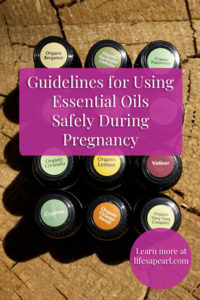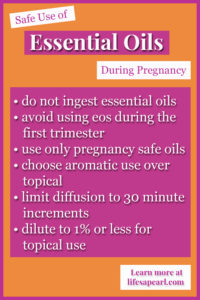Disclaimer: I am not a doctor and this is not medical advice. I’m sharing what has worked for me on my journey using essential oils to support my health.
Essential oils have become incredibly popular in recent years to naturally treat all kinds of mental and physical ailments.
I regularly use eos in my daily life whether scenting homemade personal care products with them, adding a boost to cleaning goods, or diffusing them. I also turn to my roller bottles to help with allergies, sinus issues, or aches and pains before reaching for a pill. Essential oils are a wonderful way to naturally support our health, mood, and clean our home.
But when we decided to start a family, I had a bit of research to do into essentials oils and how they affect pregnancy. It’s important to remember that essential oils are powerful highly concentrated solutions. Just because something is natural doesn’t automatically mean it’s safe to use indiscriminately.
Unfortunately this is not a well studied area so there aren’t many conclusive findings. Below I share what guidelines I discovered and how I’ve altered my use of essential oils to be safe during my pregnancy.
The Importance of Purchasing Pure Oils
Since the FDA does not regulate essential oils, it’s important to make sure the oils you are using are 100% pure. The first step is always to ensure you’re purchasing from a reputable company that practices transparency by offering 3rd party test results of their oils.
I cover this further in my post, Beginning with Essential Oils, and share why I use oils from Plant Therapy. They publish the GC/MS results from every batch of oil so you can see exactly what’s in your bottle. I also appreciate their growing collection of organically sourced essential oils.
Plant Therapy believes in educating people about their products to ensure safe and proper use in supporting health. They have a large blog of resources for learning about the benefits of aromatherapy and practicing safe dilution. Another perk I’ve recently discovered it that they clearly identify which varieties of their oils are safe for pregnancy and later during nursing.
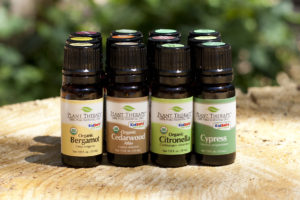
Common Guidelines for Essential Oils and Pregnancy
Essential oils do cross the placenta during pregnancy and therefore have the potential to affect the baby. It is important not to ingest essential oils, a practice I never do anyway. Many aromatherapists recommend avoiding essential oil use during the first trimester.
After the first trimester, choosing aromatic use over topical is recommended. When diffusing oils, limit to 30 minute increments and if using topically choose a 1% dilution or less with only pregnancy safe oils. Dilution is always key for safe use of essential oils but it’s especially important during pregnancy.
My Approach to EOs and Pregnancy
I stopped using essential oils all together for the first trimester besides what was in our personal care and cleaning products. That amount works out to far less than a 1% dilution with only a few drops in a large volume of product.
Since entering my second trimester I’ve been slow to get back into diffusing oils although I have a bunch of homemade room sprays and air fresheners going around the house. I’m still avoiding my roller bottles.
CBD oil is a controversial topic right now. We don’t know if it’s safe to use or not during pregnancy because there’s no research into it. My personal choice is to play it cautious and not use it at all during pregnancy. Others may make a different choice for themselves and their set of circumstances.
The biggest issue I’ve ran into is lower back pain when I would usually use a CBD roller bottle to ease it. Instead I’ve been using a hot water bottle for heat treatment, stretching, and wearing a belly band for extra support. It takes a little longer to get relief sometimes but it’s worth it to me.
Ideas for Safe Use with Common Pregnancy Ailments:
- For nausea, try inhaling peppermint oil by holding the bottle up to your nose or placing 1 drop on a tissue.
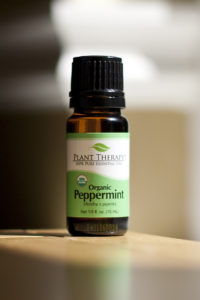
- After the first trimester, try any of the first three diffuser blends for help sleeping. Avoid the last diffuser combination since it uses clary sage!
- Boost sleep with a lavender pillow spray.
- To prevent stretch marks, try this natural homemade belly butter using lavender and frankincense frereana essential oils.
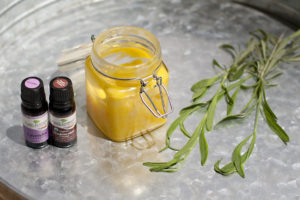
- After the first trimester for help with anxiety or stress, try any of the first three diffuser blends for stress relief. Avoid the last blend calling for clary sage!
- Add up to 4 drops of relaxing pregnancy safe scents to a bath.
Common Essential Oils that are Considered Safe for Pregnancy:
- bergamot
- cedarwood
- chamomile
- citronella
- cypress
- eucalyptus
- frankincense
- geranium
- lavender
- lemon
- lime
- sweet orange
- peppermint
- rose
- rosemary
- tea tree
- vetiver
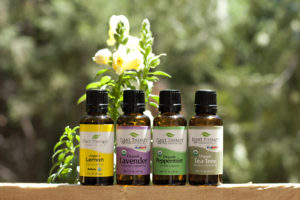
Common Oils to Avoid During Pregnancy:
- basil
- camphor
- cinnamon
- clary sage
- parsley
- sage
- wintergreen
Essential Oil Resources:
A Basic Guide to Beginning with Essential Oils
Plant Therapy Article – Are Essential Oils Safe to Use During Pregnancy?
Plant Therapy Pregnancy and Nursing Safe Chart for their Single Oils and Blends
What are your favorite pregnancy safe oils? How do you use essential oils to support your health during pregnancy?
